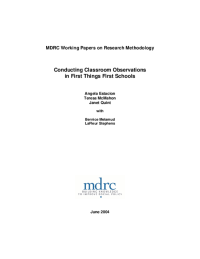Conducting Classroom Observations in First Things First Schools
The “No Child Left Behind” law is the latest educational initiative to emphasize the importance of providing all students — regardless of socioeconomic status, race, or disabilities - the opportunity to excel. Too often, less is expected of disadvantaged students. In keeping with these lower expectations, drill and practice of basic skills often takes precedence over use of advanced skills. Yet, if all students are to excel in today's economic environment they need to be able to work in teams, think critically and strategically to solve problems, and understand the importance of lifelong learning.
This working paper presents findings from a classroom observation study conducted as part of a larger study of First Things First, a whole-school reform model that was developed by the Institute for Research and Reform in Education (IRRE) and originally mounted in Kansas City, Kansas. Twelve high schools and middle schools participating in the expansion effort were phased in over a two-year period. The observational study took place between the spring of 2001 and the spring of 2003 and entailed observations in 427 English/language arts and math classes. A major goal of the observational study is to understand whether and how instructional practices changed over time with the schools' involvement in the First Things First reform. Specifically, the study seeks to determine the extent to which teachers increased their use of instructional strategies that enhance student learning. In our analysis, the First Things First planning year serves as a baseline against which subsequent changes are measured.
This paper also serves a second purpose: to describe the classroom observation methodology used in the study and the lessons learned. While classroom observations are resource-intensive, we argue that they provide valuable information that cannot be obtained in other ways. We offer suggestions about how observations can be conducted as effectively and efficiently as possible.
Beginning with a review of the research on effective teaching and learning, the paper goes on to describe the methodology of the First Things First classroom observation study and presents the study's results. It concludes with methodological tips and suggestions for instructional improvement that emerge from the findings.






